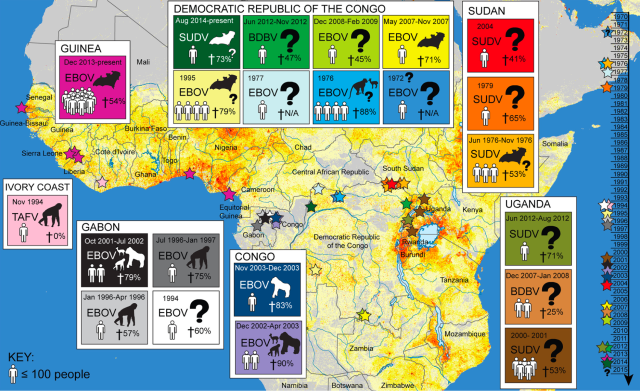Studies have agreed that the emergence of viral zoonotic diseases (disease that can be spread from animals to humans, like Ebola) can be reduced by protecting biodiversity and limiting the human impact on natural spaces. There is a very simple reason for this: the more space that wildlife has to live without human contact, the less chance there is for the animals to pass on any number of diseases to humans.
Many outbreaks, like the devastating 2014 Ebola outbreak, began with the consumption of infected bushmeat. If people are given options on other protein sources, than they run less of a risk of being infected this way.

Bats are thought to be the natural reservoirs of the Ebola virus, this is because they can become infected with the virus and remain healthy, showing no symptoms. However, they are still able to pass on the virus to other species, like humans, antelopes, chimpanzees and gorillas, who are highly susceptible to the deadly disease.
While humans are most likely to catch the disease from eating infected bushmeat like the species mentioned above, animals like chimpanzees and gorillas run a high risk of catching the virus from consuming fruits that have been partially eaten by bats.
There are several things that can be done to lower the risk of wildlife to human transmission of viruses like Ebola.
- Give wildlife a place to be wild
- The more undisturbed habitat available, the less likely bats and other wildlife are to wander into human settlements, decreasing the risk of exposure
- Give people an alternative
- While it is true that sometimes bushmeat is hunted as a delicacy, more often it is the only option for very hungry people. If people had a safer alternative to bushmeat, they would be less likely to turn to it for sustenance. The Pan Verus Project is working to start small livestock farming programs in areas that are currently reliant on bushmeat.
- Educate
- Not everyone in places where Ebola is a high risk has access to education. If education opportunities can be brought to rural areas to explain the risks associated with bushmeat and diseases then people may be less likely to hunt these animals, but only if this education comes with alternative to bushmeat.
The Pan Verus Project is working on all of these fronts to help the communities in and around the Outamba Kilimi National Park recover from the Ebola epidemic while also trying to prevent future outbreaks. Support the work here.
